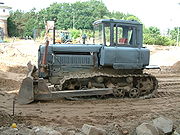
Land development
Encyclopedia

Landscape
Landscape comprises the visible features of an area of land, including the physical elements of landforms such as mountains, hills, water bodies such as rivers, lakes, ponds and the sea, living elements of land cover including indigenous vegetation, human elements including different forms of...
in any number of ways such as:
- changing landforms from a naturalNaturalNatural is an adjective that refers to Nature.Natural may refer too:In science and mathematics:* Natural transformation, category theory in mathematics* Natural foods...
or semi-natural state for a purpose such as agricultureAgricultureAgriculture is the cultivation of animals, plants, fungi and other life forms for food, fiber, and other products used to sustain life. Agriculture was the key implement in the rise of sedentary human civilization, whereby farming of domesticated species created food surpluses that nurtured the...
or housingHouseA house is a building or structure that has the ability to be occupied for dwelling by human beings or other creatures. The term house includes many kinds of different dwellings ranging from rudimentary huts of nomadic tribes to free standing individual structures... - subdividingSubdivision (land)Subdivision is the act of dividing land into pieces that are easier to sell or otherwise develop, usually via a plat. The former single piece as a whole is then known in the United States as a subdivision...
real estateReal estateIn general use, esp. North American, 'real estate' is taken to mean "Property consisting of land and the buildings on it, along with its natural resources such as crops, minerals, or water; immovable property of this nature; an interest vested in this; an item of real property; buildings or...
into lotsLot (real estate)In real estate, a lot or plot is a tract or parcel of land owned or meant to be owned by some owner. A lot is essentially considered a parcel of real property in some countries or immovable property in other countries...
, typically for the purpose of building homeHomeA home is a place of residence or refuge. When it refers to a building, it is usually a place in which an individual or a family can rest and store personal property. Most modern-day households contain sanitary facilities and a means of preparing food. Animals have their own homes as well, either...
s - developing property or changing its purpose, for example by converting an unused factoryFactoryA factory or manufacturing plant is an industrial building where laborers manufacture goods or supervise machines processing one product into another. Most modern factories have large warehouses or warehouse-like facilities that contain heavy equipment used for assembly line production...
complex into condominiums
See also
- Land managementLand managementLand management is the process of managing the use and development of land resources. Land resources are used for a variety of purposes which may include organic agriculture, reforestation, water resource management and eco-tourism projects.-See also:*Sustainable land management*Acreage...
- Leopold matrixLeopold matrixThe Leopold matrix is a qualitative environmental impact assessment method pioneered in 1971. It is used to identify the potential impact of a project on the environment. The system consists of a matrix with columns representing the various activities of the project, and rows representing the...
- Subdivision (land)Subdivision (land)Subdivision is the act of dividing land into pieces that are easier to sell or otherwise develop, usually via a plat. The former single piece as a whole is then known in the United States as a subdivision...
- Sustainable agricultureSustainable agricultureSustainable agriculture is the practice of farming using principles of ecology, the study of relationships between organisms and their environment...
- Real estate developer
- Urban planningUrban planningUrban planning incorporates areas such as economics, design, ecology, sociology, geography, law, political science, and statistics to guide and ensure the orderly development of settlements and communities....

